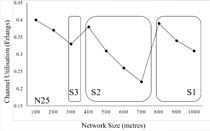Intelligent Medium Access Control for Underwater Acoustic Communication Networks
Interest in our seas and oceans is on the rise, but underwater exploration is hampered by the hostile and harsh environment. Underwater devices tend to be expensive and bulky due to the sophisticated sensing and signal processing technology required for traditional applications. Such devices are often deployed for short term missions, logging data for subsequent analysis when the devices are retrieved from the water. There is currently a lot of interest in the design of underwater networks comprising a potentially large number of much simpler low-cost sensing and communication devices, for remote environmental monitoring over a wide area. Such networks will require a simple and efficient means of communicating collected data through the network and back to a gateway (on a ship or shore).
The purpose of this PhD is to design a new approach for medium access control for underwater acoustic networks, which can provide high channel utilisation by avoiding excessive delay, collisions and overheads. The UW-ALOHA-Q protocol is being developed for future underwater networks, based upon the use of reinforcement learning and asynchronous operation. It is fully distributed protocol which benefits from low complexity and there is no requirement for any form of global synchronisation. Results demonstrate that UW-ALOHA-Q can provide high channel utilisation and good scalability. Its application to different types of single-hop network has been explored to gain a fundamental understanding of its potential. Ongoing work is now looking at its use for multi-hop underwater networks.

Members
- Sung Hyun Park
- Paul Mitchell
- David Grace
Funding
- This PhD is supported by a scholarship from the Department of Electronic Engineering
Dates
- October 2016 to
September 2019
Research
